Simplifying Your Life? Are you feeling overwhelmed by the amount of stuff in your life? Is your home cluttered with unnecessary objects, making it hard to think clearly?
In a society where strict routines are common, finding happiness and balance can be challenging. The key to achieving this balance lies in our daily habits and how we organize them. One popular method for achieving this balance, popularized by Marie Kondo, is the idea of decluttering.
By decluttering our living spaces, we can also declutter our minds. Getting rid of excess belongings creates space for unexpected opportunities. When our homes or thoughts are cluttered, it’s difficult to maintain focus, clarity, and a peaceful atmosphere to relax in. This visual clutter can be overwhelming and can even affect our family members.
One strategy to regain control and organization in simplifying your life is through decluttering. As we explore further, you’ll discover the mental benefits of decluttering, which can refresh your outlook on life and lead you toward a clutter-free existence.
What is Decluttering?
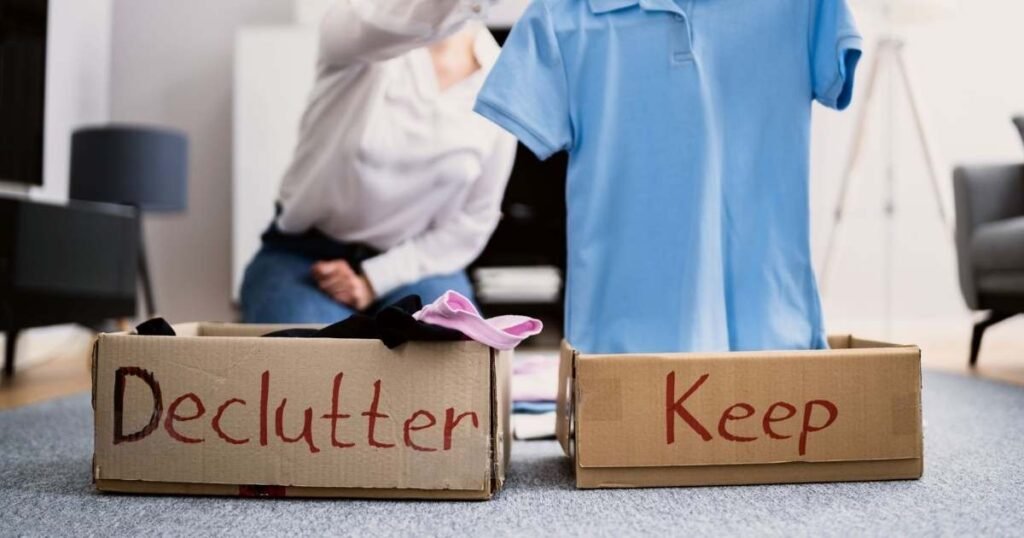
Simplifying your life, disconnecting, and organizing are the key elements to consider when tackling clutter in our lives. While it may seem straightforward, these aspects hold the true essence of the process. Many of us mistakenly believe that accumulating more possessions leads to happiness, but the reality often proves otherwise. In truth, our material belongings can often tie us down rather than bring us joy.
The goal of decluttering is to address the chaos and disorder in our lives. It involves seeking contentment and embracing a simpler lifestyle by removing anything that lacks purpose or value. When we discuss organizing our living spaces, we also aim to organize various aspects of our lives that disrupt our daily routines, such as work commitments, relationships, and even our digital habits.
Why should you consider decluttering?
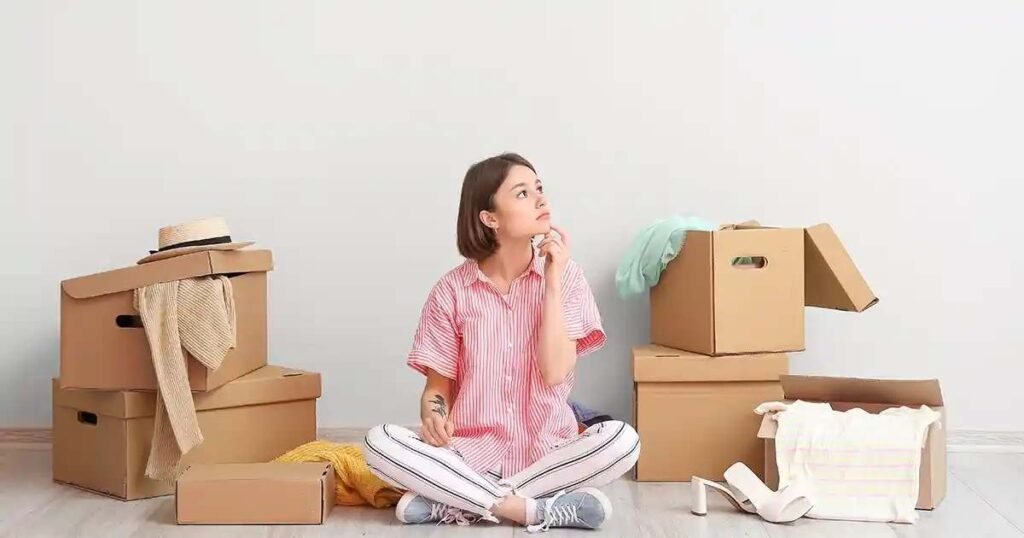
You might not see the link between organizing your home and self-care at first. But once you start decluttering, you’ll find it’s more than just cleaning, it becomes a way of simplifying your life.
Decluttering can have a positive impact on your physical, mental, and emotional health. It’s good for your mental health because it can make you feel in control, happier, and less stressed. A tidy environment can also help your mind relax.
Decluttering Improves Mental Clarity
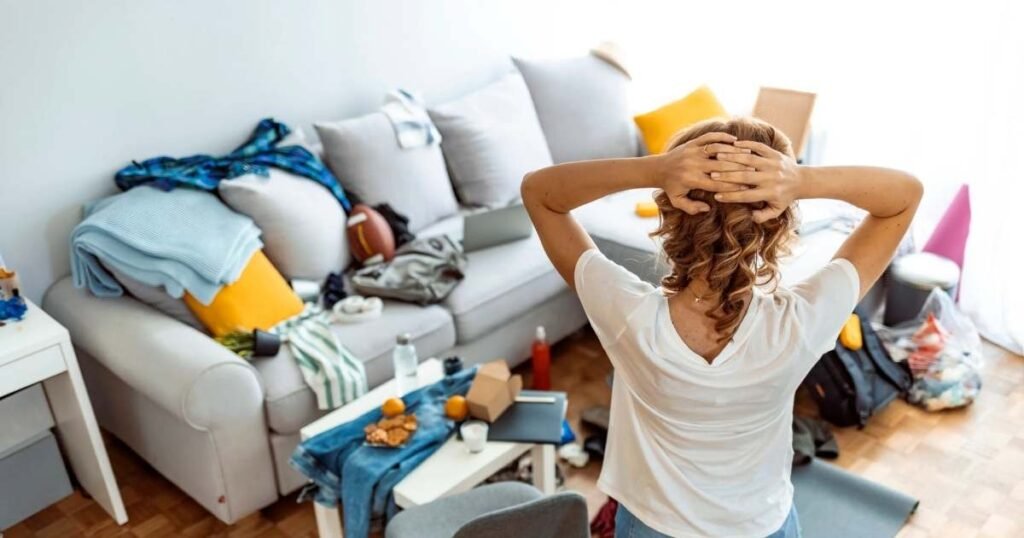
Do you struggle to find the right shirt in a messy wardrobe? Have trouble finding your wallet and keys on a cluttered kitchen table? Or is your garage door blocked by boxes of small items? You’re not the only one facing these issues.
We often plan to organize our spaces later, but as time passes, our belongings continue to accumulate in our homes, offices, and cars. However, clutter affects our mental health more than we realize. Cleaning and organizing our spaces is not only about making them look neat; it also significantly benefits our mental state.
By removing unnecessary items, you will notice improvements in your mental health. You’ll be able to focus better and overcome the mental blocks that prevent you from moving forward. It’s like giving your mind a breath of fresh air!
Therefore, if you’re fed up with constantly searching for items or having trouble leaving your house on time due to disorganization, consider decluttering. An organized space can remarkably enhance your mental health. Welcome improved concentration, say goodbye to mental clutter, and enjoy a calmer, more productive mindset. Let’s tackle decluttering and overcome those mental blocks together.
Decluttering is A Form of Self-care
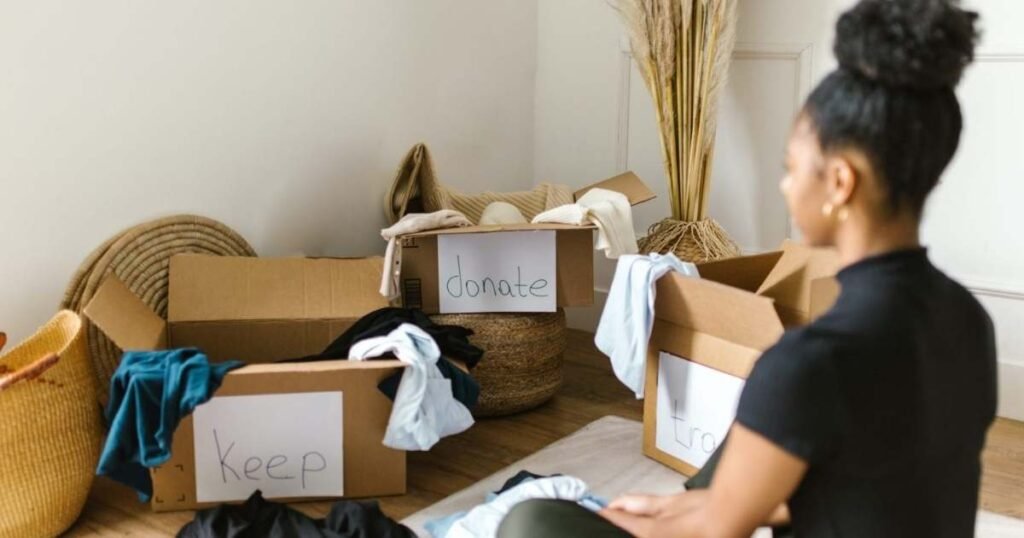
Self-care means taking care of our health, happiness, and well-being. While many think self-care is just about enjoying things like bubble baths or spa treatments, it’s much broader.
Yes, enjoying a bath or beauty treatments is a lovely part of self-care. But self-care is more than that. It includes doing things that make our lives better and happier, even if they’re sometimes hard or require effort. Surprisingly, activities like decluttering are important for self-care too.
Decluttering is a key aspect of self-care and simplifying your life. It might not be the first thing you think of for self-care, but it’s very important. Clearing out clutter and organizing our space makes us feel calm, reduces stress, and helps us focus on important things. So, decluttering is a powerful self-care act!
Discover Peace: Declutter for Better Concentration
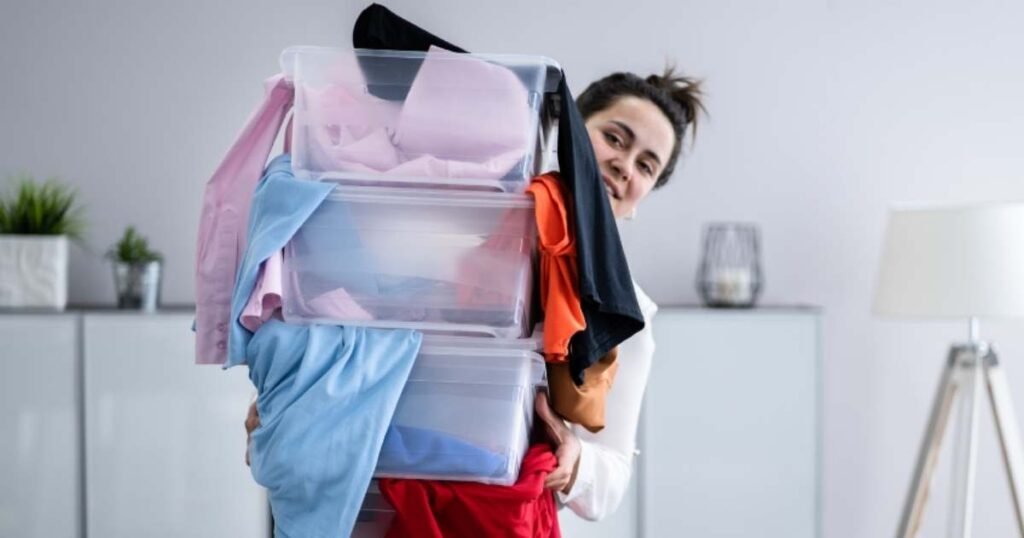
Let’s be honest, a messy environment can interfere with your focus. When clutter piles up, it’s hard to keep your attention where it needs to be. However, there’s a way out the benefit of a tidy space.
Having a clean environment with everything in its right place makes focusing much easier. Cleaning up can help your mind stay focused, making it simpler to complete tasks efficiently. It essentially clears the way for your brain to succeed.
I understand the idea of decluttering might seem daunting. But, there’s good news: you can beat the clutter. One effective strategy I love is incorporating decluttering into your daily or weekly habits. It truly makes a difference!
Consider trying a quick daily clean-up method known as the “ten-second tidy.” It’s a brief daily session to keep clutter at bay and fend off feelings of overwhelm and anxiety. By making this a consistent habit, we keep control and prevent clutter from building up.
So, don’t let clutter distract you anymore. Welcome the tranquility that decluttering brings. By adding small, regular cleaning efforts to your routine, managing mess becomes much simpler. You’ll notice a significant improvement in your ability to focus and be productive. Farewell to distractions, and hello to increased efficiency!
Decluttering is A Promise To Your Own Happiness

Let’s discuss the significance of organizing and how it can genuinely improve your life. It’s not a one-time task; it’s a dedication to establishing an environment that aligns with your objectives.
When you start the decluttering process, you’re not just organizing physical belongings; you’re constructing a space that nurtures your well-being. Instead of feeling controlled by circumstances, you become the authority of your own space. You have the authority to determine how things should be.
Imagine this: being surrounded by items that bring you genuine joy and pride. It’s an amazing sensation, believe me! When you shape your surroundings to mirror your values and bring happiness, everything transforms. Your space becomes a wellspring of inspiration, motivation, and positivity.
So, my friend, don’t view organization as a tedious task. Embrace it as a pledge to live your optimal life. Take charge of your environment, let go of what no longer benefits you, and craft a space that elevates and sustains you. You deserve to be surrounded by things that bring you joy and pride. Get prepared for a life where every corner sparks happiness!
Managing Stress and Enhancing Well-being Through Decluttering
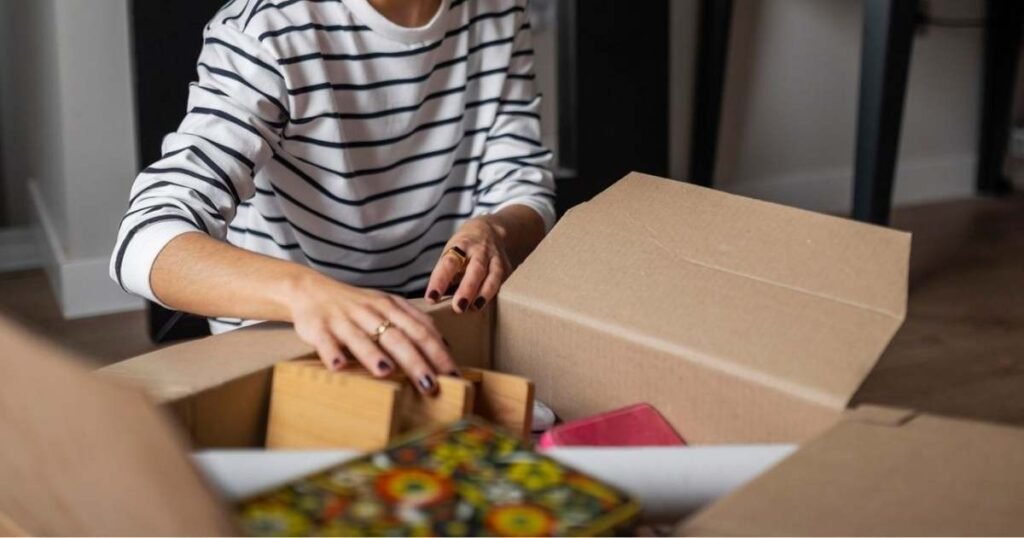
In these times when stress levels are on the rise, it is essential to understand the role our daily activities play in fostering anxiety. Often, the disorder and clutter around us are overlooked factors contributing to this stress.
This is where the principles of minimalism and the Marie Kondo method of tidying have become widely embraced. They propose a remedy for the stress induced by clutter through the simple act of decluttering. This process involves organizing items and creating a peaceful setting, which remarkably improves your mood and mental clarity.
Decluttering not only clears physical space but also opens up space mentally. It serves as a mental refresh, enabling clearer thought and effortless access to your belongings. Additionally, decluttering brings about a regained sense of control over your environment, boosting your confidence in managing life’s challenges.
Therefore, prioritize your mental health by decluttering. Move away from the stress caused by the disorder and welcome the soothing influence of a tidy space. The positive impact on your mood, the peace it brings to your mind, and the restored control over your life will surprise you. Together, let’s restore our peace of mind.
Let’s discuss how having too many belongings and a cluttered environment can impact your stress levels. Surprisingly, it can affect you in various ways. Consider these examples:
- A cluttered home can consume your time, energy, and effort. Maintaining a clean environment becomes more challenging when things are disorganized. I’ve experienced it myself!
- Think about it: the more possessions you have, the more there is to untidy and clean. It creates a never-ending cycle that takes away your precious time and energy. Wouldn’t it be nice to have more free time for activities you love, rather than constantly cleaning up?
- And the frustrating searches for misplaced items – it’s a time-wasting activity that may lead to buying replacements, contributing to both clutter and expenses. Keeping track of all your possessions becomes difficult, but it doesn’t have to be that way!
- Now, imagine hosting visitors and feeling proud of your home instead of embarrassed. With an organized space, you’ll be prepared to welcome guests warmly. No more worrying about your house’s condition – you can relax and enjoy their company without discomfort.
So, simplifying your life and make it more enjoyable. Take a step towards an organized home that reduces stress and frees up your time. You deserve a space that brings you joy and peace of mind. Let’s create an environment that truly supports your well-being!
If you found this video helpful and enjoyable, please give us a thumbs up! Stay tuned for more valuable tips. We have plenty of insights coming your way, so stay connected. Thank you for watching and being part of our community!
Final Thoughts
In our modern society, where chaos often reigns supreme, the practice of minimalism and decluttering emerges as a beacon of hope for those seeking solace amidst the storm. Through intentional simplification and organization, we carve out spaces of tranquility within our homes and minds.
Decluttering isn’t merely about tidying up; it’s a profound act of self-care, a promise to prioritize our happiness and well-being. By shedding the weight of excess possessions, we liberate ourselves from the burden of materialism, finding clarity and peace in the process.
As we journey towards a clutter-free existence, let us remember that decluttering is not just about creating physical space—it’s about reclaiming control over our lives, nurturing our mental health, and fostering a sense of inner peace.
FAQs
What exactly is decluttering, and why is it important?
Decluttering involves simplifying your life, disconnecting, and organizing to address chaos and disorder in your life. It’s essential because it helps us seek contentment and embrace a simpler lifestyle by removing anything that lacks purpose or value.
How does decluttering contribute to self-care?
Decluttering is a form of self-care and simplifying your life because it makes us feel calm, reduces stress, and helps us focus on important things. By clearing out clutter and organizing our space, we create an environment that nurtures our well-being.
What benefits does decluttering offer for mental clarity?
Decluttering improves mental clarity by removing unnecessary items, allowing us to focus better and overcome mental blocks. It creates a clean, organized space that promotes a calmer and more productive mindset.
How can decluttering help manage stress and enhance well-being?
Decluttering reduces stress by creating a peaceful environment and restoring a sense of control over our lives. It clears physical and mental space, improves mood and mental clarity, and boosts confidence in managing life’s challenges.
